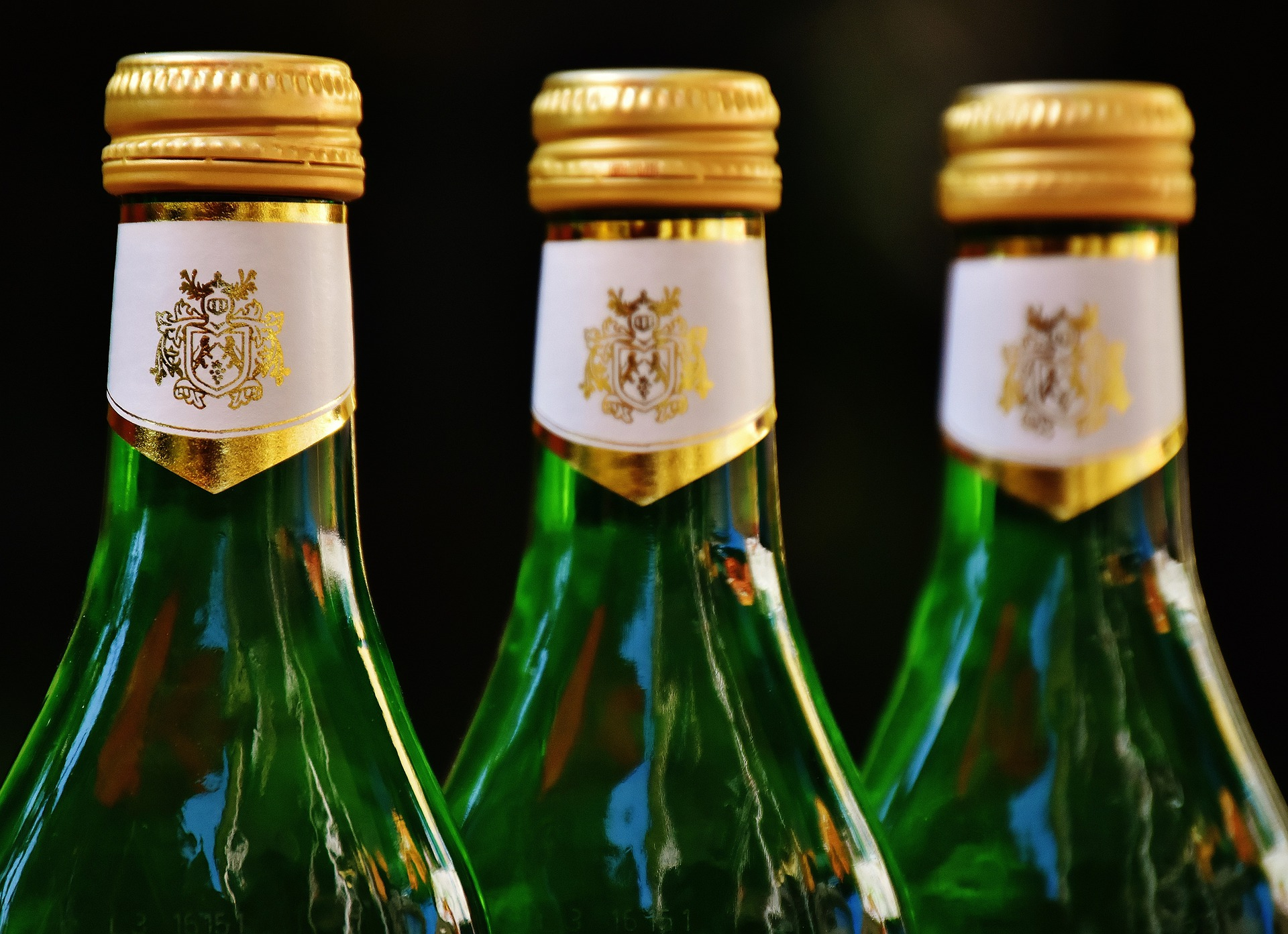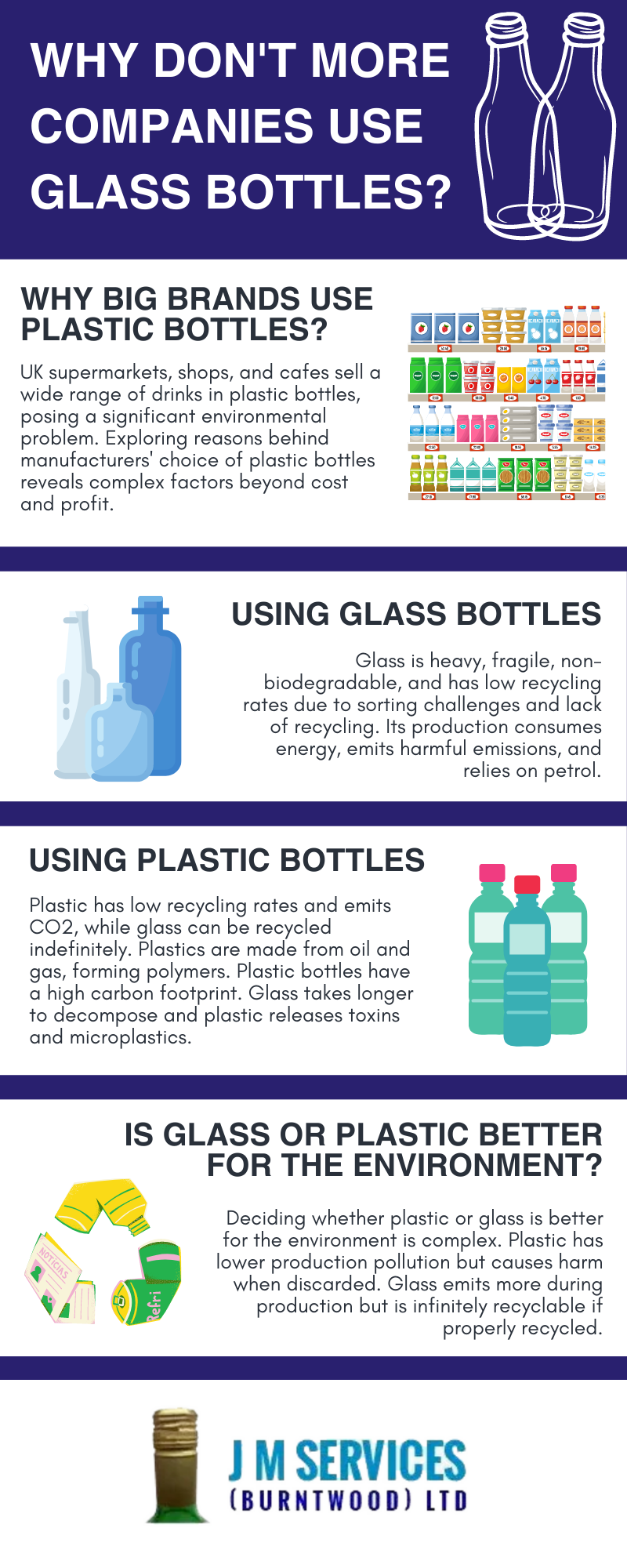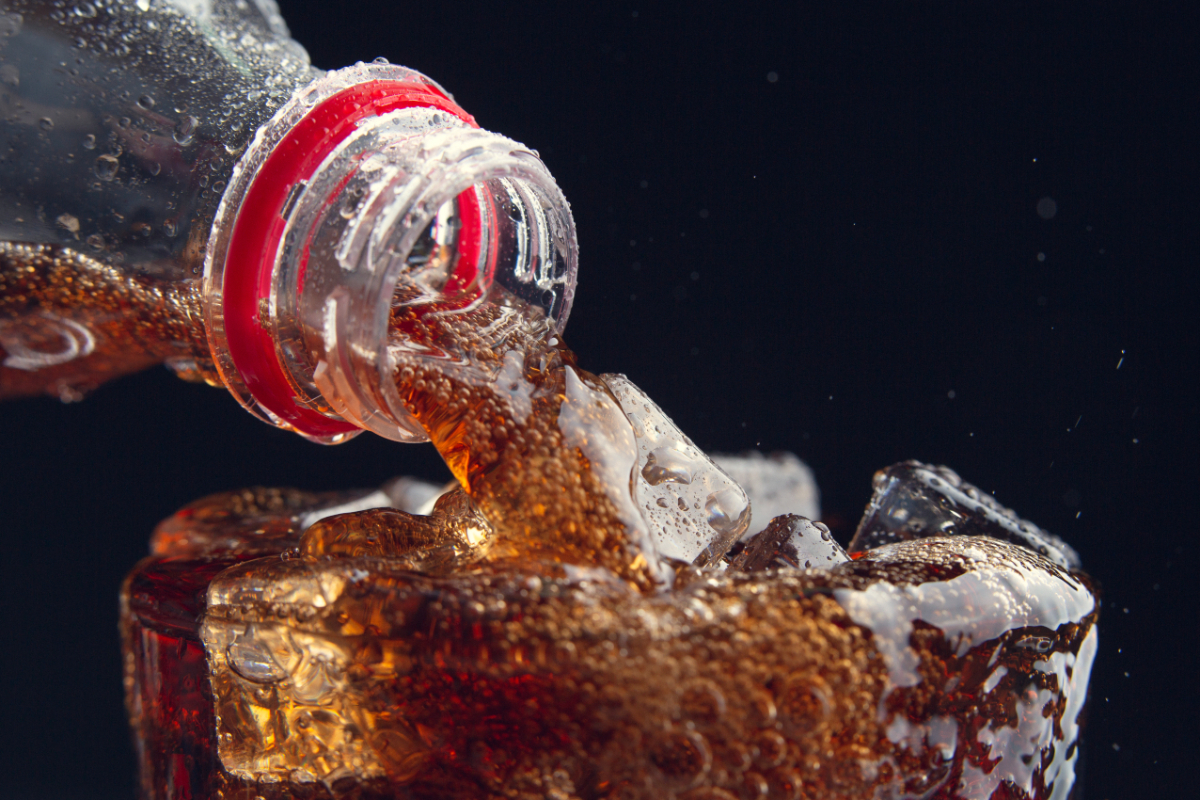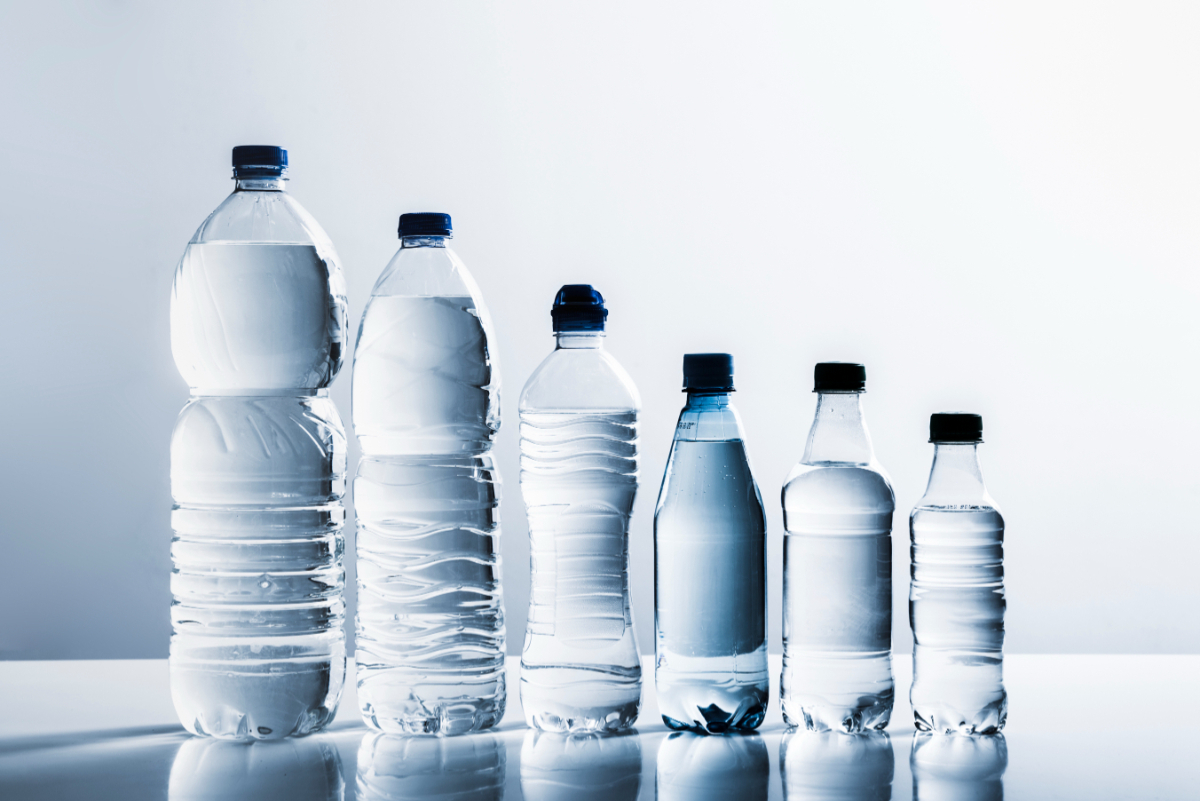This article asks: Why dont more companies use glass bottles?.Delve into the factors influencing companies' decisions. Understand the considerations such as cost, transportation, and environmental impact that play a role in why some companies opt for plastic over glass bottles. Gain insights into the complexities of packaging choices in today's market.
Why Big Brands Use Plastic Bottles
If you go into any supermarket, corner shop, petrol garage or cafe in the UK, you're likely to find fridges full of drinks. Everything from Coca-Cola to Lucozade, water and iced coffee is all available - most likely packaged in plastic bottles. As you can imagine, this means that millions, if not billions, of plastic bottles are sold every year. This is a significant problem, as plastic is not easy to dispose of or recycle sustainably.
Which begs the question, why do manufacturers choose plastic bottles if they are so bad for the environment? It might not be as simple as cutting costs and making a profit. There may be deeper and more complex issues affecting their decision. This article will consider this choice to use plastic bottles for all our mass-produced beverages and why manufacturers might be making this choice.
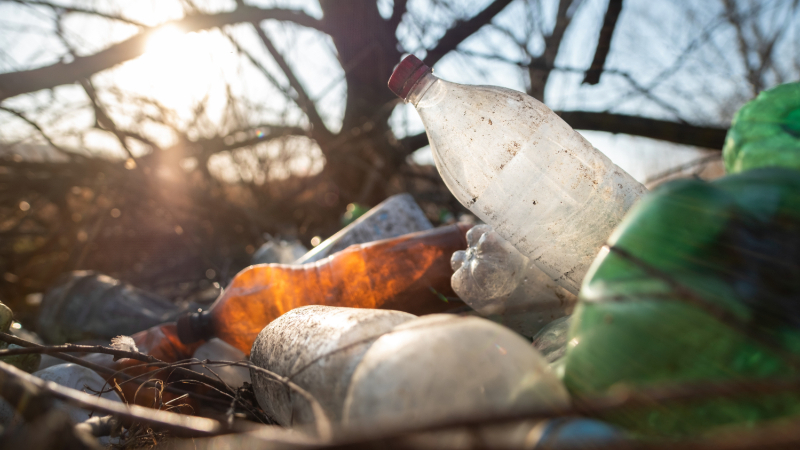
Plastic Bottle Biggest Offenders
The Coca-Cola Company, PepsiCo and Nestle are the three biggest contributors to global plastic pollution. This was proven in a study where hundreds of thousands of pieces of rubbish were collected from beaches in 42 countries around the world.
Coca-Cola branded waste was found littering beaches in 40 of these countries, making them the worst culprit in the whole study. But this was only the waste that could be identified with the brand.
Given that Coca-Cola produces more than 3 million tonnes of plastic waste a year, their pollution could be significantly more than this.
Using Glass Bottles
While producing glass causes a lot more pollution than producing plastic, there are some benefits glass can offer. For example, it can be endlessly recycled without compromising its purity or durability. However, that all hinges on people actually recycling their glass bottles.
Problems With Glass
One other annoying aspect of glass is that it is heavier and more fragile than plastic. Therefore, transport pollution is also higher for glass, not to mention the loss of revenue due to breakages.
Is Glass Biodegradable?
Glass is not biodegradable, and it can take millions of years for it to decompose naturally. However, the only by-product of glass breaking down is silica, which is still a natural substance and non-toxic.
Can Glass Be Recycled?
Here's the elephant in the room. While glass is easily recyclable, the vast majority of people don't recycle their glass waste. The US alone throws away 10 million tonnes of glass per year, and only 1/3 of this is recycled. There are several reasons why glass recycling isn't as effective as we would like.
One is that coloured glass must be melted and recycled with like colours, which makes sorting more of a hassle. Additionally, many people will throw non-recyclable materials in with their recycling, which contaminates the whole batch.
Glass Emissions + Energy
The process of turning virgin materials into glass requires a lot of energy and resources. Silica mining is an incredibly harmful industry, reducing natural biodiversity. Not to mention the transportation emissions generated by moving these materials to processing centres.
However, it's the melting furnaces that are the biggest offenders when it comes to glass pollution. The fossil fuels burned to heat these furnaces to incredibly high temperatures emit tonnes of harmful emissions into our atmosphere. At a basic level, it takes 1 litre of petrol to make 1 kg of glass.
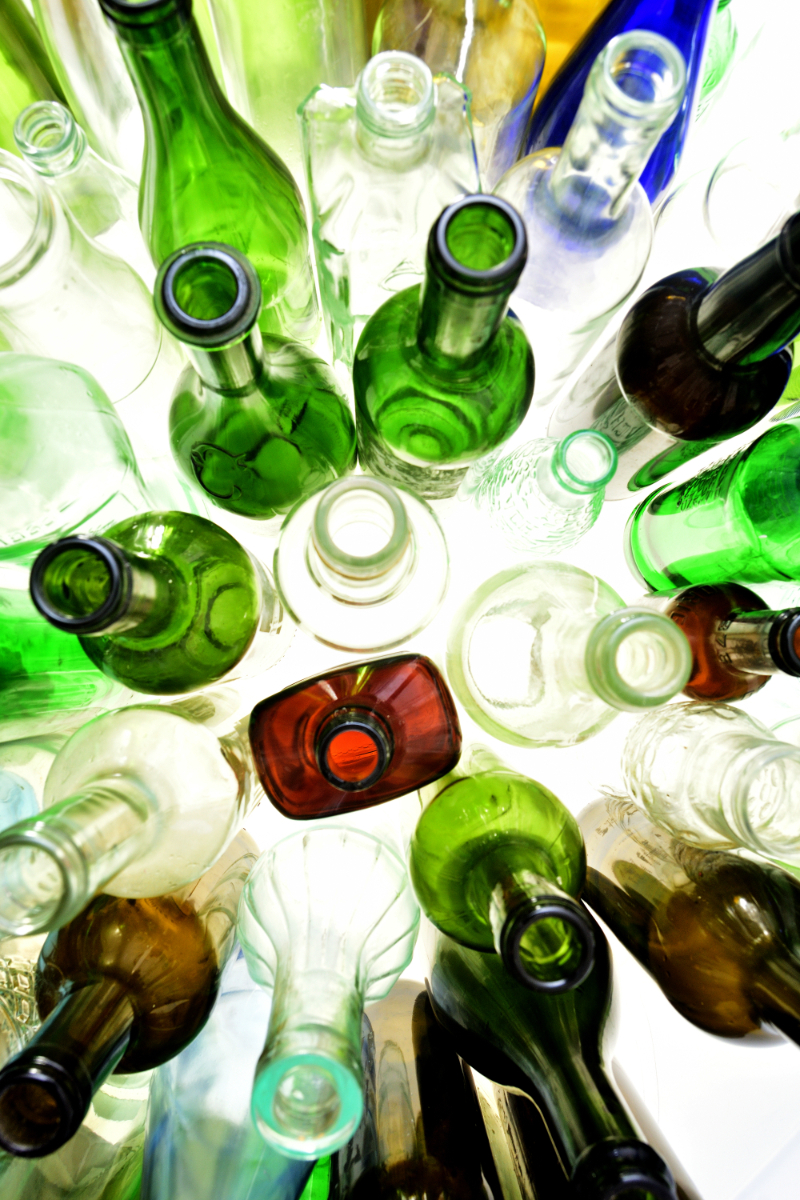
Arranging Coloured Bottles
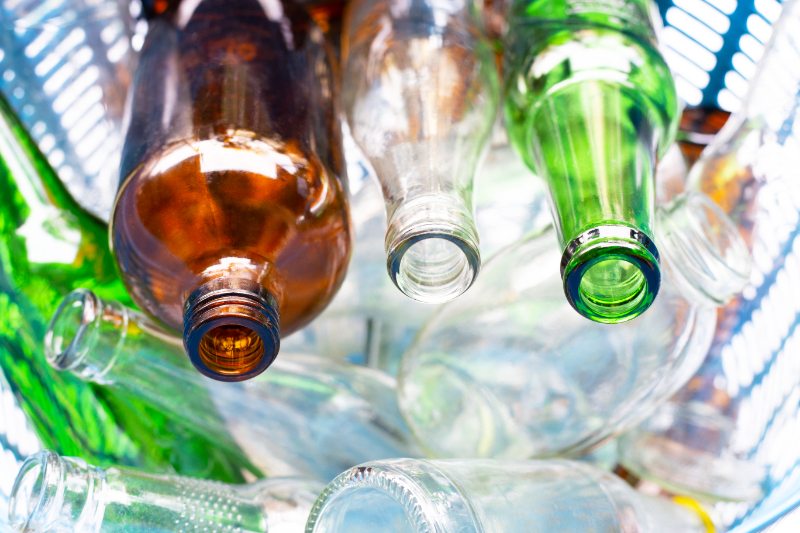
Recycling Glass Bottles
Using Plastic Bottles
Recyclers and zero-waste advocates tend to have an issue with plastic, but is it really as bad as we think?
Can Plastic Be Recycled?
While plastic is widely recyclable, its recycling rates are even worse than glass. With billions of tonnes of plastic already in the world, the fact only 9% of it gets recycled is a worrying statistic. The main reason for this is that recycling plastic does reduce its quality, unlike the ever-green nature of glass.
Carbon Footprint Of Plastic
Throughout its entire life, a piece of plastic will emit carbon dioxide into the atmosphere. The plastic industry alone generates billions of tonnes of CO2, whether through production, post-production or transportation. Again, it's important to remember that glass also releases vast amounts of emissions during the production process.
What's Used In Making Plastic?
The two main ingredients in plastics are oil and natural gas. These components are treated in a process known as "cracking", where they are broken down into hydrocarbon monomers. These include things like ethylene and styrene, which are then stitched together into polymers, which gives us things like polystyrene.
Plastic Emissions + Energy
Research suggests that the life cycle of a plastic bottle is far more carbon-intense than other container materials. For example, the water industry alone uses between 32 and 54 million barrels of oil per year to create plastic bottles. And this is just one corner of the drinks market.
Think of the countless other beverages besides water that comes in plastic bottles, and you start to see the problem. Add in transportation emissions, and soon enough, you can see the bigger bleaker picture.
Is Plastic Biodegradable?
While glass takes millions of years to break down, plastic only takes 1,000. However, while it's easily broken down, it's important to remember that as it does so, plastic leaches toxic chemicals into our environment.
While the only byproduct of glass breaking down is silica (sand), plastics are full of hydrocarbons, which pose a significant threat to our wildlife and environment. They also break down into microplastics, which are also incredibly harmful to our soils and water supplies.

Plastic Bottle Pollution
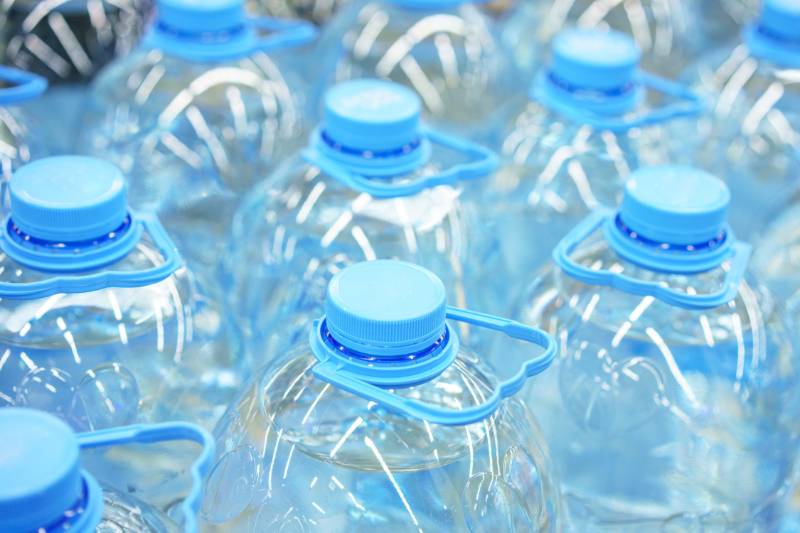
Recycling Plastic Bottles
Before the wonder material that is plastic burst onto the manufacturing scene, glass, steel and aluminium were the popular containers for beverages and soft drinks. Naturally, the early versions of plastic weren't very effective as drink containers. Chemicals from early plastics easily leeched into the drinks and they couldn't maintain the fizz of carbonated drinks. However, the introduction of PET made all the difference.
Once this form of plastic was patented, the material was ready for general use. But the throw-away nature of plastic bottles was planned from the start. Lloyd Stouffer, editor of Modern Plastics, Inc, stated in the 1950s that, "the future of plastics is in the trash can". Essentially, if they could encourage people to throw their plastic away after one use, they could sell more.
So, plastic is cheap to produce and consumers can buy your products time and again to maximise profits. However, the pollution plastic bottles create is significant. Manufacturers should look to use alternatives, but what are the alternatives to plastic bottles?
Essentially we need to find something which has the durability and preservative qualities of plastic that is also cheap to produce. The answer? Notpla. This is a neutral material made from seaweed and other plant material that is fully biodegradable.
This is a tricky question to answer. While plastic is more harmful when it reaches our environment after production, its manufacturing pollution is relatively low. This means glass causes more environmental harm during production, but is kinder afterwards. This is mainly due to the heat required to melt glass being much higher than for plastic. Therefore, it's tricky overall whether to say plastic or glass is better for the environment.
While plastic doesn't produce as much pollution during production, it is far more harmful to our environment once we throw it away. Alternatively, glass produces a vast amount of emissions during the manufacturing process, but can be eternally recycled once we have the bottles in our hands. The only thing is to ensure consumers remember to recycle their glass.
We hope this article has answered your questions about: Why Don't More Companies Use Glass Bottles?
Are you looking for experts who can service capping machines in the UK or Europe? Then call the experts at JM Services (Burntwood) LTD today.
We offer professional Capping Machine Sales and repair throughout the UK including Birmingham, Nottingham, Coventry, Leicester, Stoke-on-Trent. That’s not all, we undertake machine servicing for bottle capping machines. Get in touch with us if you have any queries.

